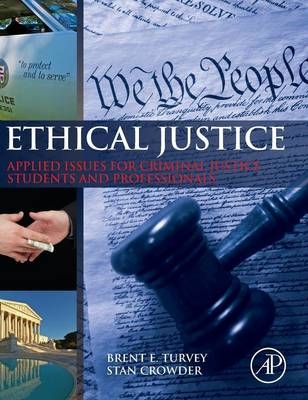
Ethical Justice
Academic Press Inc (Verlag)
978-0-12-404597-2 (ISBN)
This textbook was developed from an idiom shared by the authors and contributors alike: ethics and ethical challenges are generally black and white - not gray. They are akin to the pregnant woman or the gunshot victim; one cannot be a little pregnant or a little shot. Consequently, professional conduct is either ethical or it is not. Unafraid to be the harbingers, Turvey and Crowder set forth the parameters of key ethical issues across the five pillars of the criminal justice system: law enforcement, corrections, courts, forensic science, and academia. It demonstrates how each pillar is dependent upon its professional membership, and also upon the supporting efforts of the other pillars - with respect to both character and culture.With contributions from case-working experts across the CJ spectrum, this text reveals hard-earned insights into issues that are often absent from textbooks born out of just theory and research. Part 1 examines ethic issues in academia, with chapters on ethics for CJ students, CJ educators, and ethics in CJ research. Part 2 examines ethical issues in law enforcement, with separate chapters on law enforcement administration and criminal investigations. Part 3 examines ethical issues in the forensic services, considering the separate roles of crime lab administration and evidence examination. Part 4 examines ethical issues in the courts, with chapters discussing the prosecution, the defense, and the judiciary. Part 5 examines ethical issues in corrections, separately considering corrections staff and treatment staff in a forensic setting. The text concludes with Part 6, which examines ethical issues in a broad professional sense with respect to professional organizations and whistleblowers.Ethical Justice: Applied Issues for Criminal Justice Students and Professionals is intended for use as a textbook at the college and university, by undergraduate students enrolled in a program related to any of the CJ professions. It is intended to guide them through the real-world issues that they will encounter in both the classroom and in the professional community. However, it can also serve as an important reference manual for the CJ professional that may work in a community that lacks ethical mentoring or leadership.
Brent E. Turvey spent his first years in college on a pre-med track only to change his course of study once his true interests took hold. He received a Bachelor of Science degree from Portland State University in Psychology, with an emphasis on Forensic Psychology, and an additional Bachelor of Science degree in History. He went on to receive his Masters of Science in Forensic Science after studying at the University of New Haven, in West Haven, Connecticut. Since graduating in 1996, Brent has consulted with many agencies, attorneys, and police departments in the United States, Australia, China, Canada, Barbados and Korea on a range of rapes, homicides, and serial/ multiple rape/ death cases, as a forensic scientist and criminal profiler. He has also been court qualified as an expert in the areas of criminal profiling, forensic science, victimology, and crime reconstruction. In August of 2002, he was invited by the Chinese People's Police Security University (CPPSU) in Beijing to lecture before groups of detectives at the Beijing, Wuhan, Hanzou, and Shanghai police bureaus. In 2005, he was invited back to China again, to lecture at the CPPSU, and to the police in Beijing and Xian - after the translation of the 2nd edition of his text into Chinese for the University. In 2007, he was invited to lecture at the 1st Behavioral Sciences Conference at the Home Team (Police) Academy in Singapore, where he also provided training to their Behavioral Science Unit. In 2012 Brent completed his PhD in Criminology from Bond University in Gold Coast, Australia. He is the author of Criminal Profiling: An Introduction to Behavioral Evidence Analysis, 1st, 2nd, 3rd and 4th Editions (1999, 2002, 2008, 2011); co- author of the Rape Investigation Handbook, 1st and 2nd Editions (2004, 2011), Crime Reconstruction 1st and 2nd Editions (2006, 2011), Forensic Victimology (2008) and Forensic Fraud (2013) - all with Elsevier Science. He is currently a full partner, Forensic Scientist, Criminal Profiler, and Instructor with Forensic Solutions, LLC, and an Adjunct Professor of Justice Studies at Oklahoma City University. He can be contacted via email at: bturvey@forensic-science.com. Stan Crowder is a retired U.S. Army Military Police Colonel. During his military career, Stan served in numerous positions including: MP Commander, Chief of Investigations for the Inspector General of Georgia, Counterdrug Commander, Battalion Commander, and Chief of Personnel. He served seven years as a civilian police officer; 5 years with Cobb County (GA) PD and 2-years with Marietta (GA) PD. He teaches at Kennesaw State University, Kennesaw, Georgia, USA, where he has been teaching since 1999 and was selected as the 2007 recipient of the Betty Siegel teaching award. His teaching areas include: Criminal Investigations, Serial Offenders, Forensic Victimology, Criminal Profiling, and Ethics in Criminal Justice. Stan has a Ph.D., MBA, and BS. He is the President of the International Association of Forensic Criminologists and the past president of the Cobb County Law Enforcement Association. He has written three textbooks with Dr. Brent Turvey: Ethical Justice: Applied Issues for Criminal Justice Students and Professionals, Anabolic Steroid Abuse in Public Safety Personnel, and Forensic Investigations: An Introduction published by Elsevier. He has contributed chapters to other textbooks. He has published articles on teaching and criminal profiling. In June 2017, Dr. Crowder was appointed to the Georgia Peace Officer Standards and Training Council as an advisory member. He can be contacted at: scrowder@kennesaw.edu.
1. An Introduction to Ethics
PART I. ACADEMIA
2. Ethical Issues for Criminal Justice Students
3. Criminal Justice Educators: Ethical Issues in Teaching
4. Criminology Research: Ethical Issues in Theory Testing and Publishing
PART II. LAW ENFORCEMENT
6. Ethical Issues in Policing
7. Ethical Issues in Criminal Investigation
8. Profiles in Police Misconduct and Crime
PART III. FORENSIC SERVICES
9. Ethical Issues in the Crime Lab
10. Ethical Issues in Forensic Examination
11. Forensic Fraud
PART IV. THE COURTS
12. Ethical Issues for Criminal Prosecutors
13. Ethical Issues for Criminal Defense Attorneys
14. Ethical Issues in the Judiciary
PART V. CORRECTIONS
15. Ethical Issues for Corrections Staff
16. Ethical Issues for Treatment Staff in Correctional Settings
PART VI. PROFESSIONAL ETHICS
17. Ethical Professional Conduct
18. The Professional Resume: Ethical Considerations
19. The Role of Professional Organizations in Criminal Justice
Glossary
| Erscheint lt. Verlag | 7.8.2013 |
|---|---|
| Verlagsort | San Diego |
| Sprache | englisch |
| Maße | 191 x 235 mm |
| Gewicht | 1180 g |
| Themenwelt | Recht / Steuern ► EU / Internationales Recht |
| Recht / Steuern ► Strafrecht ► Kriminologie | |
| Recht / Steuern ► Strafrecht ► Strafverfahrensrecht | |
| Sozialwissenschaften ► Soziologie | |
| ISBN-10 | 0-12-404597-9 / 0124045979 |
| ISBN-13 | 978-0-12-404597-2 / 9780124045972 |
| Zustand | Neuware |
| Haben Sie eine Frage zum Produkt? |
aus dem Bereich


